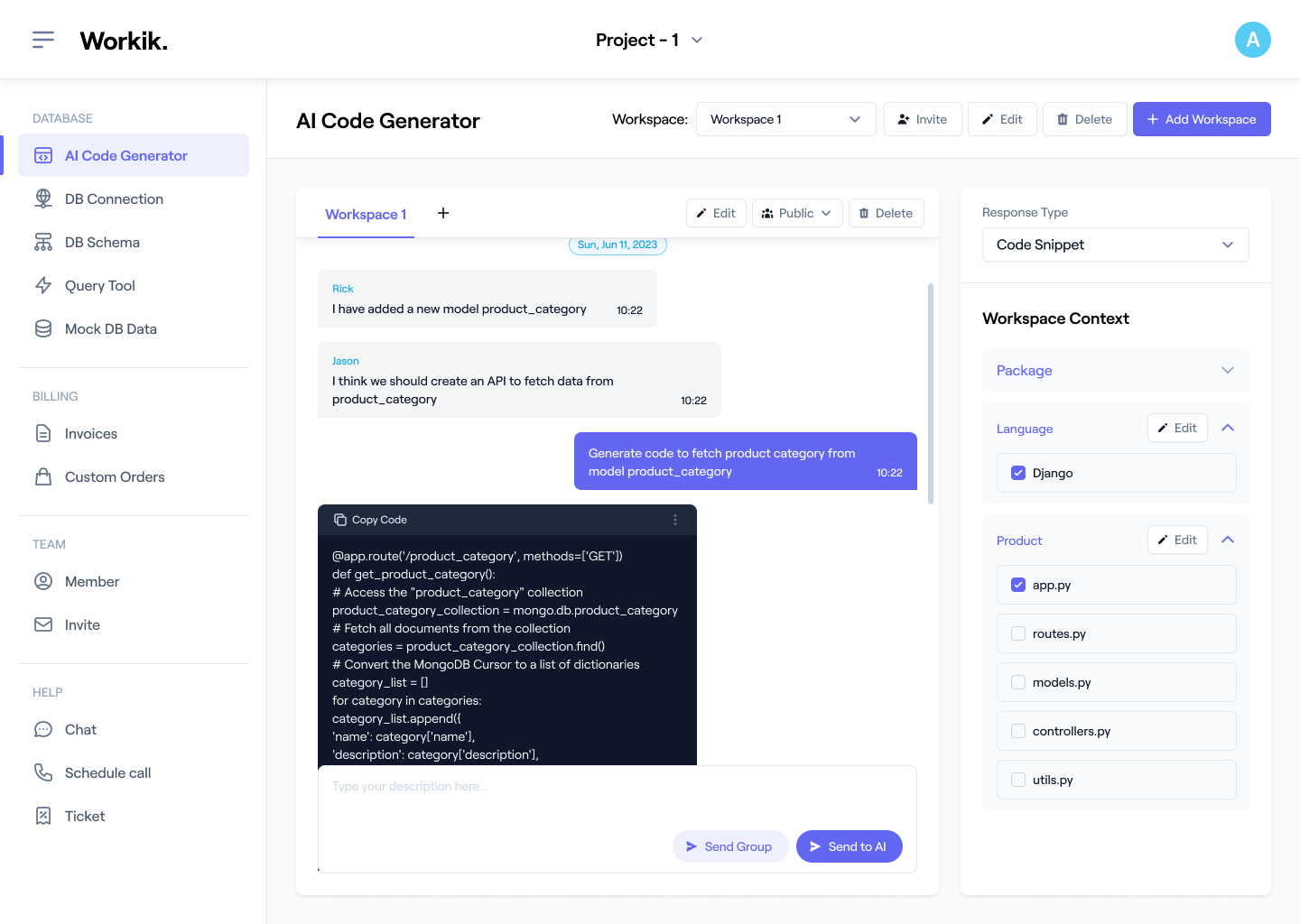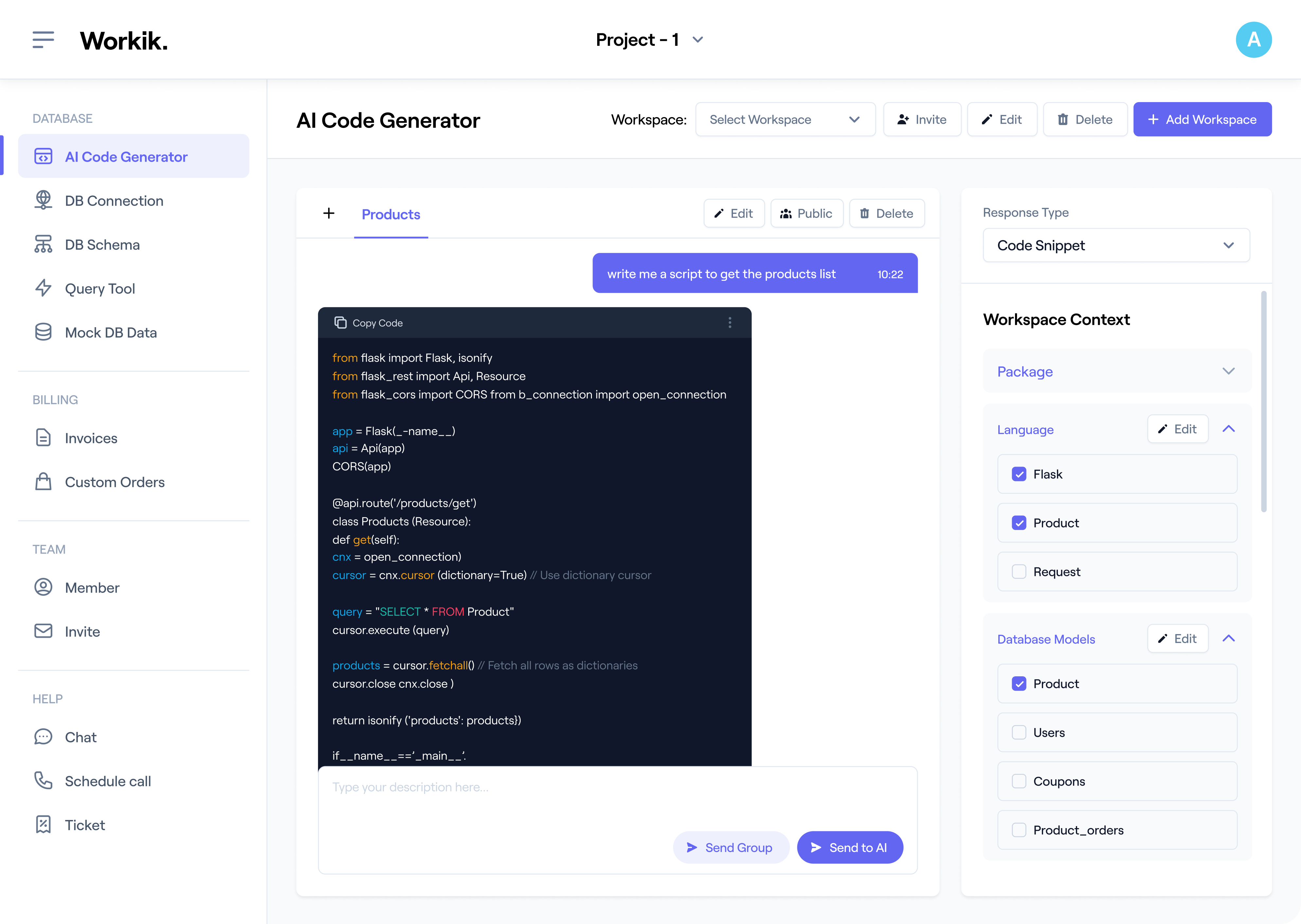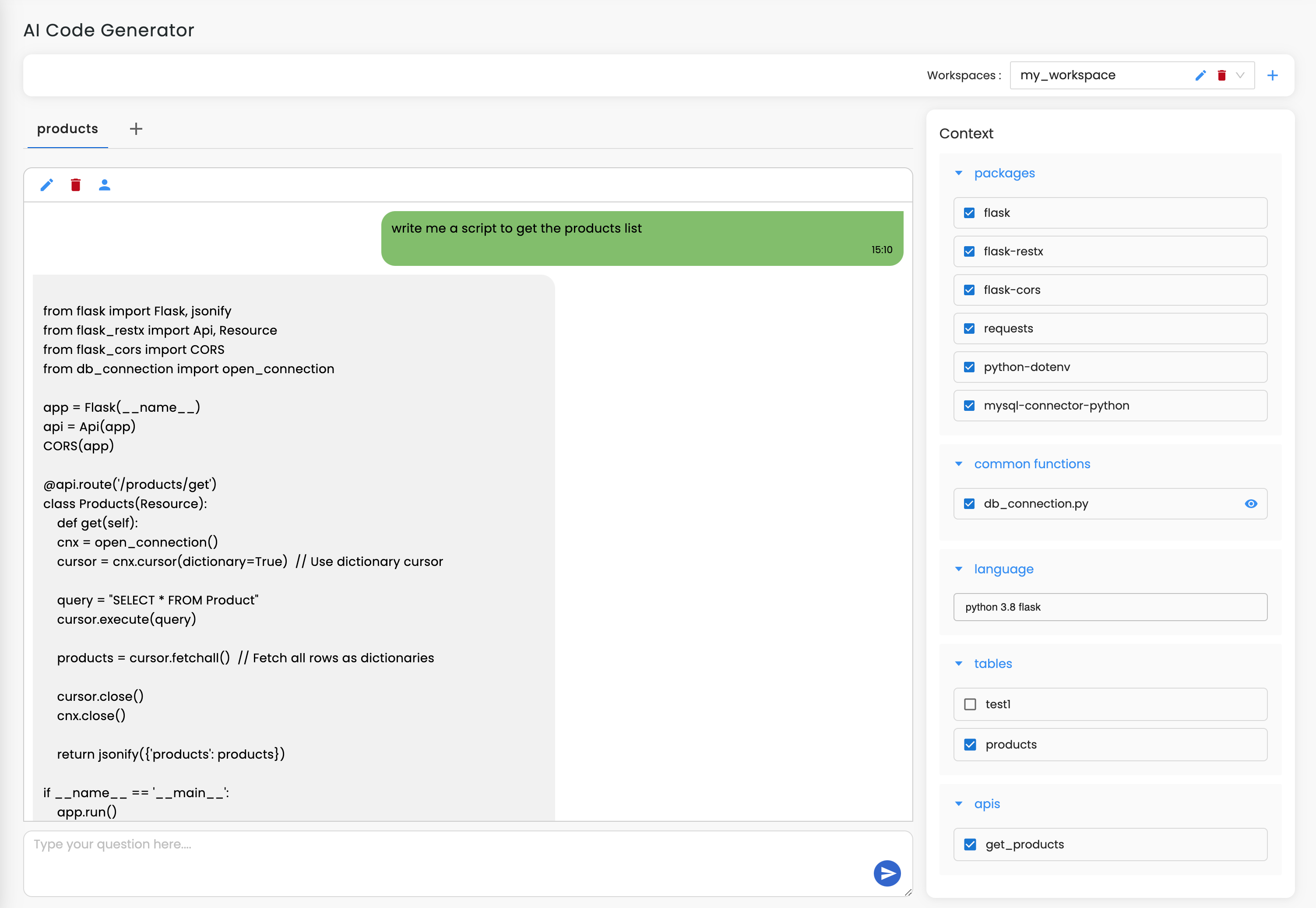
Join our community to see how developers are using Workik AI everyday.
Features

Instant Metadata Creation
Use AI to generate optimized meta tags, titles, and descriptions aligned with Google’s E-A-T guidelines.

Optimize Tags for Keywords
AI helps to integrate keywords into tags to ensure relevance and higher SERP rankings.

Generate Schema Markup
AI creates structured JSON-LD data for rich results, tailoring schema types like FAQ, Product, and Article.

Refine with Competitor Insights
AI analyzes competitor metadata & offers suggestions to improve CTR and rankings.
How it works
Sign up on Workik using Google or manually in seconds to start setting up your SEO projects.
Sync your website files or repositories from GitHub, GitLab, or Bitbucket. Define specific project requirements like target keywords, competitor benchmarks, and structured data needs for precise AI-powered tag generation.
AI can generate SEO-specific tags, including meta titles, descriptions, and schema markup. It adapts to your website’s structure, suggesting enhancements for improved keyword integration, visibility, and rankings.
Invite team members to Workik to refine tags, analyze performance data, and align strategies using AI-driven insights for better search engine outcomes.


Expand
.png)
.png)
Expand


Expand


Expand


Expand


Expand


Expand


TESTIMONIALS
Real Stories, Real Results with Workik
Workik AI saves me hours by generating schema markup and optimizing tags effortlessly.

Rachel Kim
Front-End Developer
The AI-generated meta tags and insights are spot-on, streamlining my SEO workflows.

David Thompson
Digital Marketing Lead
Perfect for backend tasks—structured data and keyword optimization made integration smooth.

Alissa Madison
Backend Developer
What are the popular use cases of the Workik AI-Assisted SEO Tag Generator?


Popular use cases of Workik AI-Assisted SEO Tag Generator for developers include but are not limited to:
* Generate SEO meta tags like titles, descriptions, and keywords.
* Automate schema markup creation for structured data like FAQ, Product, and Article.
* Optimize tags for high-performing keywords with competitive analysis.
* Create responsive meta tags for multi-platform and multilingual SEO strategies.
* Simplify metadata updates with auto-suggestions for dynamic content.
* Analyze and refine existing tags to improve CTR and search rankings.
* Generate dynamic tags for blog posts and e-commerce pages.
What contexts can I add to optimize AI-powered SEO tag generation in Workik?


To enhance AI-powered SEO tag generation, you can add any of the following context on Workik:
* Link your website repos from GitHub, GitLab, or Bitbucket.
* Define target keywords, search goals, and competitor benchmarks.
* Include structured data types such as Product, FAQ, and Breadcrumbs.
* Add page-level SEO requirements like multilingual support and platform-specific needs.
* Provide site architecture details like sitemaps and navigation structures.
How does Workik AI enhance metadata for structured multimedia SEO?


Workik AI can generate videoObject and imageObject schema markup, ensuring metadata like thumbnails, durations, and captions align with search engine requirements. For example, it can structure JSON-LD for a product demo video, enhancing its visibility in video carousels and SERP features.
Can Workik AI help with optimizing tags for voice search?


Yes! With a focus on conversational keywords, AI generates voice-friendly tags like “Where to buy affordable laptops near me” or “Best vegan recipes today.” This enhances visibility on platforms like Google Assistant or Siri, capturing voice-driven search traffic.
Generate Code For Free

SEO Tags: Question and Answer
An SEO tag is metadata embedded in a webpage to help search engines understand its content. These include meta titles, descriptions, keywords, and structured data, which optimize visibility and relevance in search engine results. It not only informs search engines about the topic but also entices users to click, influencing click-through rates.
Popular tools and platforms:
Keyword Research Tools: Ahrefs, SEMrush, Moz
Web Analytics: Google Analytics, Adobe Analytics
Metadata Management: Screaming Frog, Rank Math, Yoast SEO
Schema Markup Generators: Schema.org, Merkle Schema Markup Generator
Technical SEO Tools: Sitebulb, GTmetrix, Google Search Console
Popular use cases of SEO include:
E-Commerce:
Optimizes product tags, creates keyword-rich descriptions, and adds schema for better visibility on SERPs.
Content Marketing:
Enhances blog metadata and tags for higher rankings and improved traffic.
Local SEO:
Generates location-specific metadata for businesses to rank higher in local searches.
Video SEO:
Creates metadata for video content, optimizing it for platforms like YouTube and Google Video.
Image SEO:
Adds alt tags and descriptive metadata to images for better search indexing and accessibility.
Career opportunities and technical roles involving SEO include SEO Specialist, Technical SEO Consultant, Digital Marketing Analyst, Content Strategist, Web Developer (SEO Focus), Schema Markup Developer, Data Analyst (SEO), Local SEO Consultant.
Workik AI provides extensive support for SEO tasks, including:
Metadata Generation:
Creates optimized meta titles, descriptions, and keywords based on content and target audience.
Schema Markup Creation:
Generates JSON-LD for rich snippets like FAQs, Articles, and Products.
Competitive Analysis:
Analyzes competitor metadata and suggests improvements to gain an edge.
Local SEO Optimization:
Builds location-based metadata for small businesses to rank in local search results.
Performance Analytics:
Tracks CTR and visibility of generated tags, suggesting real-time adjustments.
Multilingual SEO:
Creates SEO tags in multiple languages for global audience reach.
Voice Search Optimization:
Develops conversational, voice-friendly tags to capture voice search traffic.
Dynamic Content Tagging:
Automates tag creation for blogs and dynamic pages, keeping metadata updated with content changes.
Explore more on Workik
Get in touch
Don't miss any updates of our product.
© Workik Inc. 2026 All rights reserved.

